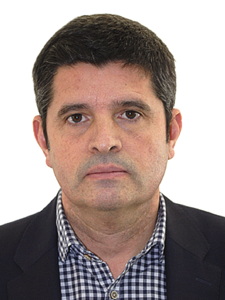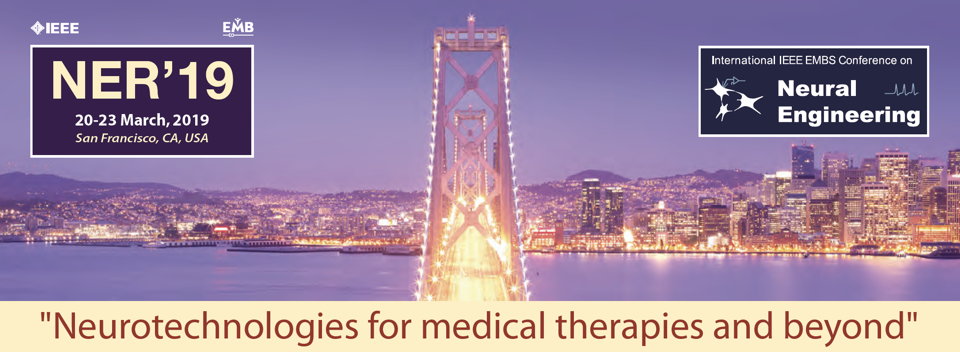Recent technological developments coupled with news that a private U.S. Insurer will adopt a national policy change for coverage of personal exoskeleton devices is causing a renewed patient, scientific, engineering, and commercial impetus for further advances in the design of next generation devices for technological facilitation for assistive and rehabilitative applications.
We devote this half-day workshop to review the state of the art and challenges to overcome for next generation neurorobotics for rehabilitation, including brain-controlled wearable exoskeletons/prostheses and combination therapies such as exoskeleton, brain-machine interface and functional electrical stimulation. The workshop will include an over view of the session on technological facilitation chaired by Prof. Contreras-Vidal at the recent NIH SCI 2020 meeting and detailed presentations while allowing audience participation.
Organizers
Jose ‘Pepe’ Luis Contreras-Vidal
 Jose ‘Pepe’ Luis Contreras-Vidal, Ph.D. (IEEE Fellow; and a member of EMB, SMC, RAS, IEEE Systems Council, IEEE Brain and IEEE Roadmap IRUG) is Hugh Roy and Lillie Cranz Cullen Distinguished Professor of Electrical & Computer Engineering, Director of the Laboratory for Noninvasive Brain-Machine Interface Systems, and Director the NSF Industry-University Collaborative Research Center on Building Reliable Advances and Innovations in Neurotechnologies (IUCRC BRAIN) at the University of Houston. He is a Full Affiliate in the Department of Neurosurgery at the Houston Methodist Hospital, Director of Human-Machine Systems at The Institute for Rehabilitation and Research (TIRR) Memorial Hermann, and Distinguished Visiting Professor at the Tecnologico de Monterrey, Mexico.
Jose ‘Pepe’ Luis Contreras-Vidal, Ph.D. (IEEE Fellow; and a member of EMB, SMC, RAS, IEEE Systems Council, IEEE Brain and IEEE Roadmap IRUG) is Hugh Roy and Lillie Cranz Cullen Distinguished Professor of Electrical & Computer Engineering, Director of the Laboratory for Noninvasive Brain-Machine Interface Systems, and Director the NSF Industry-University Collaborative Research Center on Building Reliable Advances and Innovations in Neurotechnologies (IUCRC BRAIN) at the University of Houston. He is a Full Affiliate in the Department of Neurosurgery at the Houston Methodist Hospital, Director of Human-Machine Systems at The Institute for Rehabilitation and Research (TIRR) Memorial Hermann, and Distinguished Visiting Professor at the Tecnologico de Monterrey, Mexico.
Dr. Contreras-Vidal’s primary research focuses on brain-machine interfaces and wearable exoskeletons, while also working at the intersection of art, science and engineering to study creativity and neuroaesthetics. His laboratory has pioneered the development of noninvasive BMI systems based on scalp EEG to control motorized exoskeletons, virtual avatars, and robotic prosthetic limbs to restore motor function in individuals with spinal cord injury, stroke and limb amputation. Dr. Contreras-Vidal has pioneered the concept of ‘The Museum and the Classroom as Laboratories” to understand the brain in action and in context in free behaving individuals, with applications to neuroaesthetics, art therapy, informal learning and regulatory science.
Dr. Contreras-Vidal’s research has been supported by the NIH, NSF, VA, DARPA, ONR, Schlumberger, the Cullen Foundation, Mission Connect – TIRR Foundation, IUCRC BRAIN, and industry. He is in the editorial boards of IEEE Human-Machine Systems, International Journal Mobile Human Computer Interaction, Frontiers in Neuroprosthetics, Applied Bionics and Biomechanics, Brain Computer Interfaces. Dr. Contreras-Vidal’s research has reached specialized audiences and the general public through news and views reports published and/or highlighted by The Economist, Nature, Science News, Der Spiegel, National Science Foundation, Wall Street Journal, the Society for Neuroscience, O&P, Science, Scientific American, NPR’s Science Friday, and Neurology Today among others. His career development in biomedical engineering has been highlighted in the magazine Science.
Jose Pons
 Prof. Pons obtained his PhD in Physics, Universidad Complutense Madrid, in 1997. In 1998 he was appointed as Postdoctoral Fellow at the Institute for Industrial Automation of the Spanish Council for Scientific Research, CSIC. In 1999 he was awarded a position as Tenured Scientist, in 2007 a position as Research Scientist and eventually in 2008 a position as Full Professor, all of them at the same institution. Along these last ten years of research, Prof. Pons has also served as lecturer in Polytechnic University of Madrid (Robotics and Advanced Sensors and Actuators), Alfonso X El Sabio University (Systems theory and Control), Alcalá de Henares University (Robotics and Advanced Actuators). Currently, he is Distinguished Visiting Professor at Tecnológico de Monterrey.
Prof. Pons obtained his PhD in Physics, Universidad Complutense Madrid, in 1997. In 1998 he was appointed as Postdoctoral Fellow at the Institute for Industrial Automation of the Spanish Council for Scientific Research, CSIC. In 1999 he was awarded a position as Tenured Scientist, in 2007 a position as Research Scientist and eventually in 2008 a position as Full Professor, all of them at the same institution. Along these last ten years of research, Prof. Pons has also served as lecturer in Polytechnic University of Madrid (Robotics and Advanced Sensors and Actuators), Alfonso X El Sabio University (Systems theory and Control), Alcalá de Henares University (Robotics and Advanced Actuators). Currently, he is Distinguished Visiting Professor at Tecnológico de Monterrey.
In parallel to all these activities, Prof. Pons has paid a number of research visits to prestigious universities and Research institutions: in 2005, Robot Intelligence Laboratory, University Jaume I (Prof. A. del Pobil); several visits (2004, 1997, 1996) to Katholieke Universiteit te Leuven, Dept. of Mechanical Engineering (Prof. van Brussel and Prof. Reynaerts); in 2002 and 2009, Department of Cybernetics, University of Reading (Prof. P. Kyberd and Prof. W. Harwin); in 2001, Instituto de Biomecánica de Valencia (Prof. P. Vera); in 1998 and 2000, Institut für Konstruktion, Lehrst.B. für Mechanik, TU München (Prof. Pfeiffer); in 1998 and 1999, Scuola Superiore di Studi e Perfezionamento Sant’Anna, ARTS/MITECH Lab. (Prof. P. Dario) and in 1996, MIT (Prof. Brock). In total, Prof. Pons has spent a cumulative duration of 185 weeks in these research stays. The topics of the research activities have always been in line with research topics at his home research organization and span Kinematics and Dynamics of robots, Advanced Sensor and Actuator technologies, Rehabilitation and Medical robotics, Wearable Robotics as well as neuromotor and biomechanical modeling.
Prof. Pons has published along the last ten years over 100 articles in highly ranked international journals in Robotics (Robotica, Autonomous Robots, Mechanism and Machine Theory), Smart Materials, Sensors and Actuators (Sensors and Actuatos A & B, Journal of the European Ceramic Society, Bol. Soc. Esp. Cerám. V., Journal of Electroceramics, IEEE Trans. on Ultr., Ferr., and Freq. Contr.), Neuroscience (The Cerebellum, Eur. J. Neurol.), Physiology (IEEE Engineering in Medicine and Biology magazine, Physiological Measurement, Medical Biological Engineering & Computing, Technology and Health Care) or Biomechanics (Gait & Posture, Applied Bionics and Biomechanics).
Dr. Pons has also contributed during the last decade to peer-reviewed international conferences with over 100 contributions in oral presentations. In particular he has contributed to the following conferences: the series (1996-2009) of Annual IEEE Int. Conf. on Rob. and Aut.; the series of Eurosensors; the series of Actuator (held in Bremen biannually since 1996); the series of IEEE Int. Conf. on Rehab. Rob; the series of IEEE EMBS Int. IEEE EMBS Conf. on Neural Engineering and the series of Annual Int. Conf. of the IEEE Eng. in Med. & Biol. Soc.
Prof. Pons has collected most of his scientific contributions along the last decade in research monographs. It is worth highlighting his monograph (ISBN: 0-470-09197-5) on emerging actuators where his contributions on advanced SMA and Ultrasonic actuators are collected; his edited book (ISBN: 978-0-470-51294-4), where he also co-authored all chapters, on Wearable Robotics and his co-authored monograph (978-3-642-17658-6) on exoskeletons in Rehabilitation Robotics, with a particular focus on management of tremor. In addition, Prof. Pons has contributed to collective volumes on Rehabilitation Robotics (ISBN: 978-3-902613-04-2), on Rehabilitation Engineering (978-953-307-023-0), on Advances in Sensors and Actuators (ISBN: 3-8322-2745-8) or on Assistive Technologies (ISBN: 1-58603-373-5 and ISBN: 0929-6743).
Speakers
Jose L Contreras-Vidal (University of Houston NSF IUCRC BRAIN Center)
Jose Pons (CSIC)
Atilla Kilicarslan (University of Houston Noninvasive Brain-Machine Interface Lab) Justin Brantley (University of Houston Noninvasive Brain-Machine Interface Lab)
